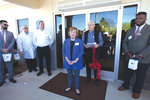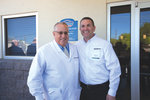









SILER CITY — A crowd of elected officials, Mountaire executive staff and community leaders gathered April 16 at the Mountaire Farms poultry plant in Siler City to celebrate an official ribbon cutting for both the plant and Mountaire’s Health and Wellness Center for employees.
“We are so glad you chose Siler City to expand,” Siler City Mayor John Grimes said, noting he spoke for the entire Siler City Board of Commissioners. “We welcome the jobs and our small businesses welcome the additional money being spent around town. We’re glad you’re here. Chickens have come home to roost in Siler City.”
Chatham County Commissioner Diana Hales also welcomed Mountaire on behalf of the county board.
“You are building on that proud tradition of hiring local workers and keeping farmers producing,” Hales said. “Work translates into dignity for the worker.”
The $170 million investment is estimated to bring approximately 1,250 jobs to Siler City, a town of about 8,000 residents.
Siler City suffered during the economic downturn around 2008, coupled with the loss of the Townsend chicken processing facility that had previously been located on the site of the current Mountaire plant.
“Thank you for your investment in Siler City,” said Alyssa Byrd, President of the Chatham Economic Development Corporation. “This investment has truly invigorated the town.”
N.C. Agriculture Commissioner Steve Troxler noted that agriculture is the largest industry in the state, with poultry accounting for about 71 percent of the industry’s receipts.
“The sun is shining both literally and figuratively on Siler City and Chatham County,” Troxler said.
N.C. Lt. Governor Dan Forest noted the value of investments like Mountaire in the community.
“This is a dream come true for small towns like this across the state,” he said. “We are very grateful for the investment you made in North Carolina and the investment you made in Siler City.”
Phillip Plylar, President of Mountaire Farms, expressed the company’s appreciation for the welcome and the support the company received from both the town and the state.
“We are grateful for being able to open this plant in the great state of North Carolina,” he said. “Because North Carolina gets it. They embrace this opportunity. They the farmers. We’re going to provide an opportunity for our workers and our community.”
Paul Nelson, Director of Processing Operations for Mountaire in Siler City, echoed that sentiment.
“To the town of Siler City, thank you for all that you’ve done,” he said. “Jack [Meadows, Siler City Planning Director] and Bryan [Thompson, Siler City Town Manager], every time we came to see you, you had a door open to us. All the elected officials and staff were all so kind.”
The officials and executives participated in the ribbon cutting for the plant and for the Health and Wellness Center. All employees that participate in Mountaire’s insurance plans are eligible to receive free health care at the company’s center on the site, which is operated by Premise Health. The center has a primary care doctor on staff with other health care professionals to provide a range of services to employees and their families free of charge.
“To be good stewards of all the assets God has entrusted to us is part of our Mountaire creed,” Dee Ann English, Executive Vice President of Mountaire said. “We believe our Health and Welness Centers are a big part of fulfilling that commitment since our people are our greatest asset.”
Touring the plant
Following the ribbon cutting, attendees were given a tour of the 265,000 square-foot facility. For safety, each attendee was provided slip proof shoe covers, gloves, a long smock, similar to a lab coat, a hair net and, if necessary, a beard net, a hard hat, ear protection, and a set of headphones which connected to a set worn by the tour guide so that attendees could hear instructions and details of the plant during the tour.
When entering the processing area, the sound was overwhelming. Even with the ear protection and the headphones, the sounds of the machines were roaring. As the tour commenced, hundreds of workers kept to their tasks of sorting, inspecting, de-boning, and packaging chickens. On conveyor belts near the ceiling of the plant, chickens and chicken parts were carried to different areas of the plant above the heads of attendees, workers, and the equipment.
The plant is kept at a very cool temperature to ensure the quality of the chicken. Workers wore layers and winter gear to perform their work. Many of them wore stop watches to ensure they maintained the correct productivity level required to process 70,000 chickens in a day. Person after person were lined up along assembly lines, processing the birds and their parts. The plant is currently processing 625,000 chickens per week but has the capacity to process 1.4 million in that time.
The water required to perform the work is significant, with the plant estimated to require about 1.25 millions of gallons a day when at full capacity. The plant uses water for sanitation and processing, with drains and concrete “streams” throughout the floors of the plant.
Attendees did not visit the “slaughter” portion of the plant, but Mountaire noted that it likes to keep the turnover of live birds to customer as close to a day as possible. This, it was explained, was to provide the customer a product with as much shelf life as possible. It was also noted that the entire plant, which is massive, is cleaned at the end of each day.
Other items that may interest you
